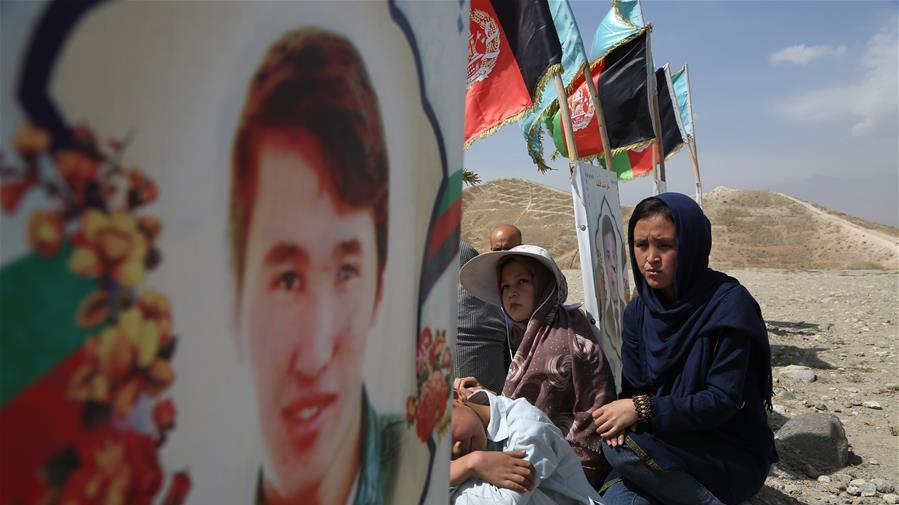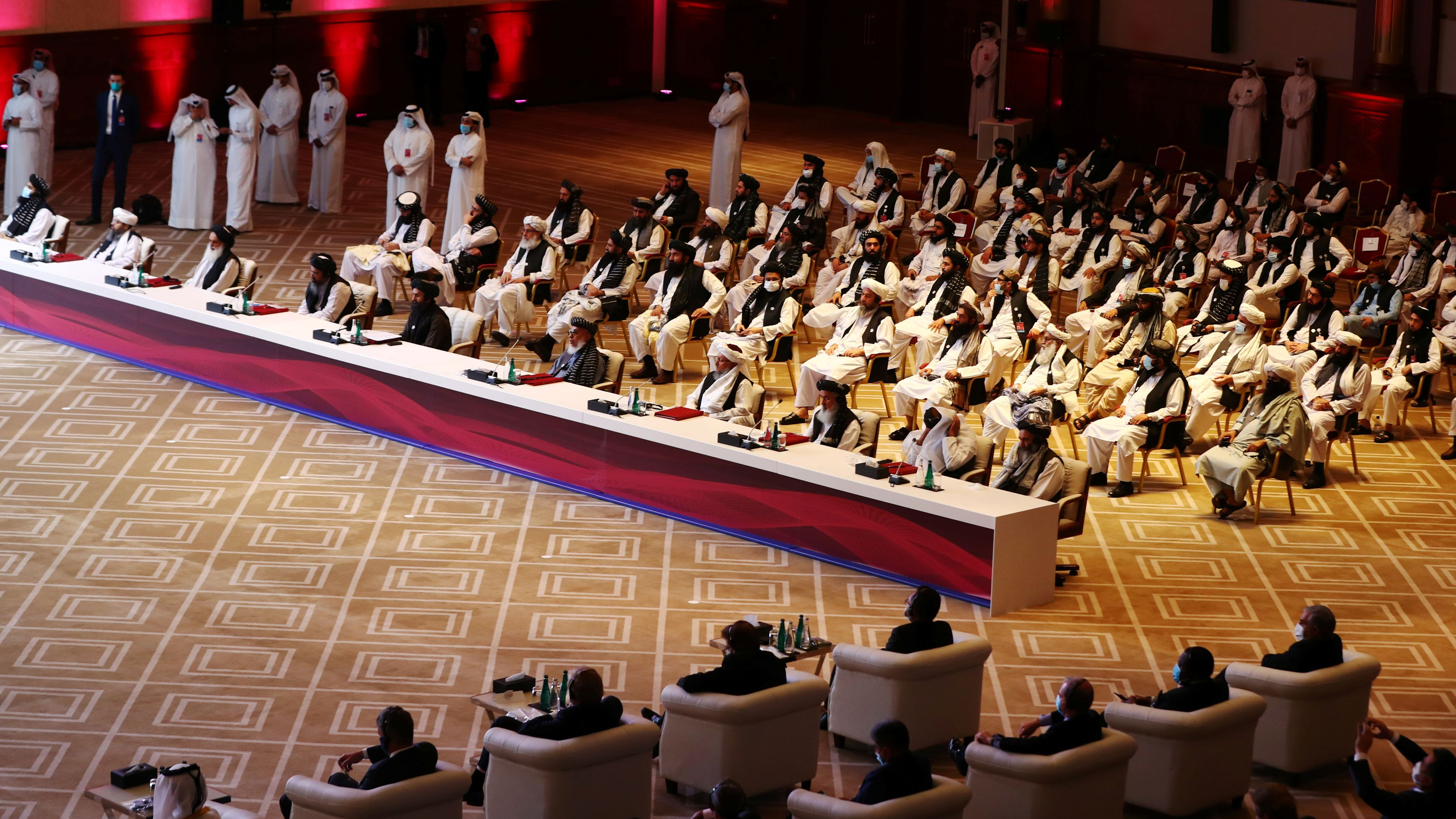
People gather at the graves of their relatives to call for a ceasefire in Kabul, capital of Afghanistan, September 14, 2020. /Xinhua
People gather at the graves of their relatives to call for a ceasefire in Kabul, capital of Afghanistan, September 14, 2020. /Xinhua
Editor's Note: Aamna Khan is an international relations PhD student at Jilin University. The article reflects the author's opinions, and not necessarily the views of CGTN.
After months of delay, the intra-Afghan talks finally kicked off in Doha, Qatar, interestingly, exactly one day after the 19th anniversary of 9/11 on September 12, 2020. There is a lot of skepticism and speculation prevailing, especially in the international media regarding the talks. Nevertheless, it's a ray of hope for peace and stability in an unfortunate country struggling for peace for the past 40 years.
Earlier this year, on February 29, a historic U.S.-Taliban agreement, the "Agreement for Bringing Peace to Afghanistan," was signed by U.S. Special Representative for Afghanistan Reconciliation Zalmay Khalilzad and Taliban's Political Deputy and Head of the Political Office Mullah Abdul Ghani Baradar in Doha, Qatar after long rounds of peace talks.
According to the agreement, intra-Afghan talks were supposed to be held in March, but they kept being delayed for some discernible reasons. One of the controversial issues concerns the release of prisoners. Kabul was reluctant to release 5,000 Taliban prisoners, a provision under the U.S.-Taliban agreement, which the Kabul government wasn't made part of. According to the agreement, the government has to release 5,000 Taliban prisoners in exchange for the Taliban's release of 1,000 government prisoners.
Under the same agreement, the U.S. promised a phased withdrawal of their remaining troops in exchange for assurances that the Taliban and Afghan security forces would prevent insurgents from carrying out acts of violence against the U.S. and its allies and would no longer let Afghanistan become a haven for other terrorist groups to attack the U.S. and its allies. The U.S. and Taliban also agreed to establish a permanent and comprehensive cease-fire in Afghanistan to achieve a political settlement.
In addition to the Afghan government and Taliban delegations, the inaugural ceremony held on September 12, in Doha of Intra-Afghan dialogue was attended by U.S. Secretary of State Mike Pompeo, Chairman of Afghan High Council for National Reconciliation Abdullah Abdullah, Qatari Foreign Minister Sheikh Mohammed bin Abdulrahman Al Thani and senior diplomats of numerous countries. Seventeen foreign ministers of different countries, including China, Pakistan, India, Iran, Germany and the UK, and heads of inter-governmental bodies, such as NATO, the UN, and the Organisation of Islamic Cooperation (OIC) have virtually participated in the meeting.
While the dialogue process has just started and many discussions and debates will be held behind closed doors, it's hard to forecast the fate of the dialogue at the moment.
However, the U.S. appears serious and much interested in achieving a speedy outcome of this dialogue. President Trump at the White House described the beginning of the talks as "a result of a bold diplomatic effort on the part of my administration in recent months and years."
"The United States will play an important role in bringing the parties together to end the decades-long war. It's been going on for almost 20 years — long before I got involved, I can tell you that," he said.
After a meeting with the Taliban in Doha, Zalmay Khalilzad, Washington's peace envoy, said the U.S. and every Afghan would like to see a deal "sooner rather than later."

Delegates attend talks between the Afghan government and Taliban insurgents in Doha, Qatar, September 12, 2020. /Reuters
Delegates attend talks between the Afghan government and Taliban insurgents in Doha, Qatar, September 12, 2020. /Reuters
The involvement of the U.S. and especially the interest of President Trump indicates urgency in the peace process. Trump seems to be in haste, probably due to upcoming elections. He doesn't have much to offer in his election campaign, plus his administration's failure to tackle the pandemic has already raised many eyebrows over whether the U.S. can remain as a sole superpower henceforward. The Afghan peace deal can definitely provide Trump with some good point scoring for reelection.
Michael Kugelman, deputy director of the Washington-based Wilson Center's Asia program, says, "Washington's goals are very simple."
"It wants intra-Afghan talks happening as soon as possible because these give the White House political cover for an imminent withdrawal," he said. "Trump likely wants a peace deal before the election so that he can garner political benefits galore and pitch himself as a Nobel Peace Prize candidate. But presumably, even he realizes it's wildly unrealistic to expect a deal so soon. These types of negotiations tend to be measured in years, not weeks."
Afghanistan needs a durable and robust practical resolution, and that might take time. The apparent urgency in the U.S. administration can lead to further complications. Any misadventure of the U.S. can be fatal, not only for Afghanistan but also for the world's stability.
Although bringing peace to this war-torn land that is struggling for peace for the past 40 years would not be a cakewalk. It calls for sincere and concrete efforts by all stakeholders inside and outside of Afghanistan. Solving the Afghan problem is possible only through dialogue and amicable means of conflict resolution.
However, in all this peacemaking process, human rights, especially rights related to women, must not be compromised at any cost. Many human rights organizations are apprehensive, considering the record of the Taliban's past regime regarding human rights, particularly those related to women's rights violations.
"An oppressive Afghanistan will not be stable, safe or prosperous," a letter written by more than 100 current and former leaders from around the globe to the negotiators says. The letter emphasized preserving equality for women as defined in the Afghan constitution and making foreign aid subject to the country's human rights situation.
A stable and peaceful Afghanistan is inevitable for the peace and prosperity of the whole region. Hence, the regional players need to play an efficient role and make concerted efforts to help Afghans achieve peace. They also need to keep a strong check on the U.S. to avoid any loopholes in the peace process that can be ruinous in the future and save Afghanistan from becoming a scapegoat in the hands of Americans for their political gains.
(If you want to contribute and have specific expertise, please contact us at opinions@cgtn.com.)